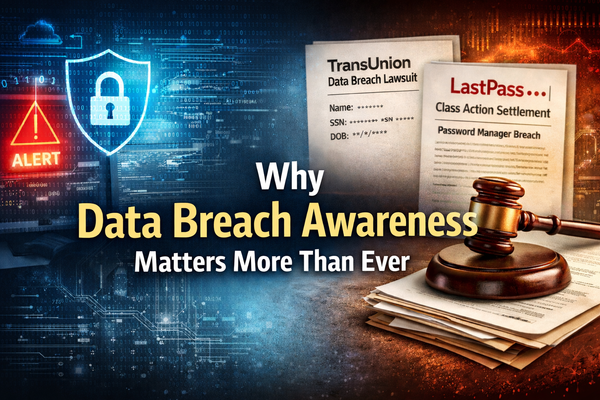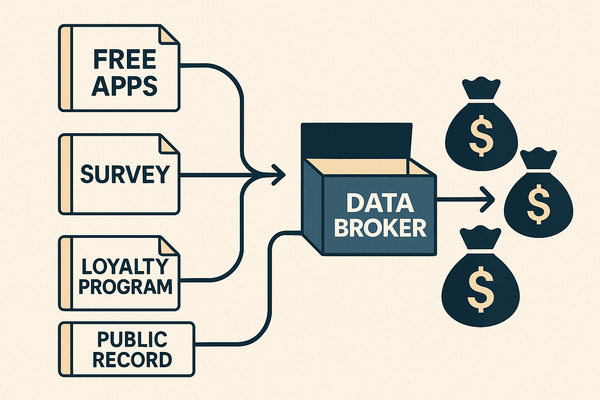From Jury Duty Jitters to Sextortion Shivers: Your Guide to Dodging Digital Danger
In this episode, we explore the dark underbelly of the digital world, from fake job offers on WhatsApp to menacing jury duty threats and even the chilling rise of "Sextortion 2.0," learn how to spot these scams, protect yourself, and fight back against these digital predators.

Show Notes
This episode examines four major scams:
The WhatsApp Job Scam: Scammers pose as employers, offering enticing job opportunities through WhatsApp messages. The catch? They demand sensitive information, like your Social Security number, as part of the application process.

The Jury Duty Scam: Exploiting fear of legal trouble, scammers contact individuals claiming they've missed jury duty. They threaten arrest or hefty fines unless immediate payment is made via untraceable methods like gift cards.

The Fake Airline Customer Service Scam: Scammers create fake websites and phone numbers mimicking legitimate airline customer service. They aim to trick stressed travellers into revealing personal and financial information under the guise of flight issues.

Sextortion 2.0: This disturbing scam involves emails claiming the scammer has hacked your device and recorded compromising videos. To add a layer of fear, they include a picture of your home, obtained through public sources, threatening to expose the non-existent videos unless you pay.

The episode highlights key strategies to protect yourself from these scams:
- Be skeptical and question everything: If it sounds too good to be true, it probably is.
- Verify information through official channels: Don't rely on contact details provided in suspicious messages; independently confirm with official sources.
- Never share sensitive information via messaging apps: Legitimate employers or government agencies will not request sensitive information through platforms like WhatsApp.
- Don't engage with suspicious emails or messages: Ignoring and reporting is the best course of action, especially for sextortion attempts.
- Remember knowledge is power: Staying informed about current scams is the first line of defense.
The episode emphasizes the importance of vigilance in the digital age and empowers listeners to fight back against scammers by:
- Reporting scams to authorities: Reporting helps track scammer activity and protect others.
- Spreading awareness: Sharing information about scams with friends and family helps build a collective defense.
Full Transcript
[Start of recording]
Okay, so we've all been there, right? Scrolling online, maybe checking out some job postings or even just looking at messages, and then boom, out of nowhere, you get this message on WhatsApp. It looks totally legit, like it's from a real company, offering you this amazing job. You know the kind I'm talking about, almost too good to be true.
Yeah. And sadly, it usually is. These scams are getting ridiculously sophisticated. They're designed to trick you into giving up all your personal info. And it all starts with one little WhatsApp message.
It's like they always say, don't talk to strangers online. But this is different. This feels like it could be the real deal, you know? I mean, a job offer, maybe even your dream job. So, how do these scammers make it seem so convincing? How do they suck people in?
It's all about your aspirations. You see, they tap into what you really want. You see that message and suddenly you're picturing yourself in this new role thinking about a better salary, amazing benefits. Then bam, that's when they go in for the kill. They ask for your social security number.
Oh, yeah. You know, this is part of the application, of course, like just to get things moving along. Totally innocent, right?
Nope. Not at all. They make it sound totally normal, like it's no big deal. But here's the thing. Real employers, they're not asking for that kind of information over WhatsApp.
Okay, so that's a huge red flag. If anyone, and I mean anyone, asks for your social security number over WhatsApp, it is 100% a scam. But what really got me were some of the actual messages these scammers are using. Like seriously, Scary good
though. They're good. They've gotten very good at sounding legit.
I actually got chills reading this one. It says, "Congratulations. You've been selected for an interview with our company. Please send your social security number and other details so we can proceed with your application." I mean, if you weren't expecting it, you could totally fall for that.
And that's exactly what they're hoping for. They want you off guard. They know you're excited about this potential job. Yeah.
And they use that excitement to make you do something you wouldn't normally do.
So besides being terrified of every WhatsApp message now, what can you do to protect yourself?
Don't be terrified. Be informed. That's how you stay safe. First things first, real employers will pretty much always reach out through official channels like email or a company website. Never ever share your social security number or any other sensitive information over a messaging app.
It's like writing your credit card number on a billboard. Just not a good idea.
Okay. But what if you're not even looking for a new job right now? Do you still need to worry about this stuff?
Absolutely. Scammers are always finding new ways to take advantage of us. And they know that almost everyone is at least a little bit afraid of legal trouble.
Oh no, this doesn't sound good.
And that's where the infamous jury duty scam comes in. It plays on that little voice in the back of your mind. That voice that goes, "Oh, shoot. Did I forget something important?"
Because honestly, jury duty is not exactly a top priority for most people.
You got that right. And the scammers, they know that. They'll call you, email you, even text you saying you missed jury duty and now there's a warrant out for your arrest or that you owe a huge fine, they want you to panic.
Wow. So, they just go straight for the fear factor, huh?
They want you to make a mistake. They need you to act without thinking. So, they'll demand payment right away. And usually, it's through things like gift cards or wire transfers, stuff that's hard to trace, and they can be very, very convincing. They might even have some of your personal information, like your name, your address, things they probably got illegally in the first place.
That's so creepy. But you said something important earlier. You said that government agencies will never ask for payments using gift cards. So if someone claiming to be from the court asks you to pay with a Starbucks gift card, that's a scam, right?
100%. If anything even seems a little bit suspicious, stop and check it out.
Don't just take their word for it.
Exactly. Find the real number for the courthouse. Call them directly and ask. Knowledge is power, my friend. You got it. They don't want to give you time to think.
So it's not even about whether or not you actually missed jury duty. It's about scaring you so much that you don't even stop to think.
Exactly. And another thing, real government agencies, they're not going to pressure you like that. They have procedures they follow.
Okay. So, we've got WhatsApp, we've got phone calls. Are there any parts of our lives these scammers haven't tried to warm their way into?
You'd be surprised. They're like digital ninjas, always finding new ways to sneak in, especially when it comes to things we really care about. Things like that dream vacation you've been planning.
Oh, no. You're going to tell me They're posing as travel agents now, right? Offering those deals that are way too good to be true.
Close, but even sneakier than that. It's called the fake airline customer service scam. Picture this. You're all packed, ready to head to the airport, and then you get an email or a call. It looks like it's from the airline, but it's not.
Uh, so they tell you there's been a change, like your flight's canceled or you need to rebook or something.
Yep. They know you're stressed and you just want to get on that plane. They're counting on you not thinking straight
because nobody wants to miss their flight. And what's worse is they make these fake websites, even fake phone numbers. How are you supposed to know it's not real?
I know it's getting harder and harder to tell.
These scammers are getting so good.
They use all the right words, the logos, everything. But here's the thing to remember. Always double check that contact information. Look at the email address. Does it match up perfectly with the airlines real address? Even one letter off could be assigned.
So, you really have to pay attention to every little detail.
Absolutely. Don't just assume. Any email or phone call is legit. Go to the airlines website, find the real customer service number, and call that.
It's better to be safe than sorry. Right.
Right. And never ever give out your credit card information unless you are 100% certain. Right. And I mean 100%. That you're dealing with the actual airline.
Okay. So, we've covered scams at work, scams at home, scams while we're on vacation. Is there anywhere that's safe?
Well, the good news is the more you know about these scams, the better you'll be at spotting them. But yeah, there's one more we need to talk about. And this one's a bit of a doozy.
Okay, now I'm really curious.
It's called Sextortion 2.0, the home edition.
That sounds terrifying.
Yeah, it's pretty unsettling. Usually starts with an email. The scammer says they've hacked into your computer or your phone and that they've recorded some pretty embarrassing videos of you.
Oh no, that's awful. But I feel like we've heard about this one before.
We have. But here's where it gets really creepy. To try and make you believe them, they'll include a picture of your house in the email.
Hold on. Wait a minute. How do they have a picture of your house? Are they like hacking into your security cameras or something?
So, they're not actually hacking into devices. They're just really good at playing mind games.
That's exactly it. They're master manipulators using fear and shame to try to extort money from you.
It's like something out of a psychological thriller. They take something ordinary, like a picture of your house, and turn it into a weapon. It's terrifying how easily our own homes can be used against us.
And what's even more disturbing is that this tactic often works. People panic. They feel trapped and they give in to the scammer's demands.
So, what can you do if you get one of these emails because I have to admit, even knowing it's likely a bluff, that kind of message would shake me up a bit.
The most important thing is don't engage, don't reply, don't send money, don't even open any attachments. These emails are designed to scare you into acting irrationally, but the best defense is a calm and measured response. So, take a deep breath, step away from the computer, and remember, they're all bark and no bite.
Exactly. And remember, this is illegal. They are criminals attempting to extort you. Report it to the authorities. The FBI takes these kinds of scams very seriously.
Okay, we've covered a lot of ground here today. From WhatsApp to jury duty to vacation nightmares and even our own homes, it's a lot to process. What's the main takeaway for our listener? What's the one thing you want them to remember?
If I had to choose just one, it would be this. Be skeptical. Question everything. In this digital age, it's so easy to get caught up in the convenience and speed of online interactions. But that convenience comes with risks.
It's like that old saying, if it sounds too good to be true, it probably is.
Absolutely. Trust your gut. If something feels off, if you have even the slightest doubt, take a step back and verify. It's better to be overly cautious than to become another victim.
So, be informed, be aware, and be empowered. You have the power to protect yourself.
Exactly. And remember, you're not alone. These scammers might be relentless, but so are we. We can fight back by arming ourselves with knowledge and spreading the word.
Okay, that's a wrap on our deep dive into the world of scams. Stay vigilant out there, everyone.
[End of recording]








